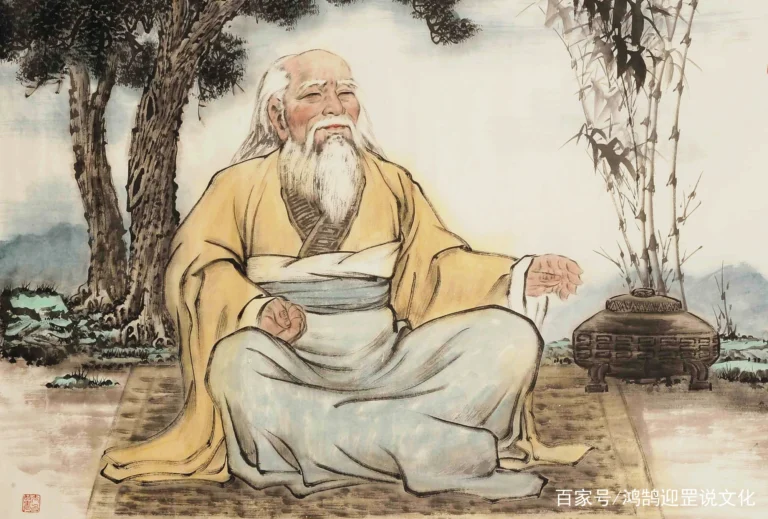老子 Laozi

Laozi, also known as Li Dan, was one of the ancient Chinese philosophers, thinkers, and one of the founders of the Daoist school of thought. His name, Laozi, translates to “Old Master” or “Old Sage,” as he is revered as the “Old Master” in Daoist teachings.

Laozi, also known as Li Dan, was one of the ancient Chinese philosophers, thinkers, and one of the founders of the Daoist school of thought. His name, Laozi, translates to “Old Master” or “Old Sage,” as he is revered as the “Old Master” in Daoist teachings.
The life and accomplishments of Laozi are relatively mysterious, surrounded by various legends and myths. According to traditional accounts, Laozi is believed to have been born in the 6th century BCE, possibly in present-day Henan Province, China. It is said that he held a high-ranking position as a senior official during the Zhou Dynasty and served as a court archivist. However, historical records on the specific details and identity of Laozi are limited, leading to some controversy regarding his true identity.
Laozi’s most famous work is the “Daodejing《道德經》“, which is considered a foundational text of Daoist philosophy. The “Daodejing” is regarded as one of the earliest philosophical works in Chinese literary history and revered as a “Daoist classic.” Written in poetic language, the text consists of 81 chapters, expounding on Laozi’s contemplations regarding the universe, the Dao, virtue, nature, and governance.
In the “Daodejing,” Laozi emphasizes the concept of the Dao, stating that the universe and all things are unified by an invisible Dao, which surpasses human understanding and serves as the fundamental principle and power of the cosmos. Laozi believes that individuals should align themselves with the natural Dao, pursue the principle of non-action (無為), and strive for inner tranquility and personal freedom.
Laozi’s philosophy emphasizes non-action, the superiority of softness over hardness, and the natural way of life characterized by non-interference. It reflects a critical reflection on the political and ethical concepts prevailing in ancient Chinese society. Laozi advocates for rulers to abandon excessive intervention and control, promoting social harmony and individual liberty. His ideas have had a profound impact on subsequent philosophical, political, and religious developments, influencing the Daoist, Confucian, Buddhist, and other philosophical traditions.
Despite the mysteries surrounding Laozi’s life and identity, his philosophical ideas have had a profound impact on Chinese culture. His concepts and teachings have been widely applied to personal cultivation, moral behavior, political governance, and the perception of nature, becoming an essential component of Chinese cultural tradition. His ideas have also been translated into various languages, influencing academic and cultural realms worldwide.
Concept
Laozi’s philosophy is primarily embodied in his work, the “Daodejing《道德經》“.
The Dao: Laozi emphasizes the concept of the Dao, believing that the universe and all things are unified by an intangible Dao. This Dao transcends human understanding and serves as the fundamental principle and power of the cosmos. Laozi suggests that individuals should align themselves with the natural Dao, seek unity with it, and achieve inner tranquility and personal freedom.
Wu Wei (無為): Laozi advocates the principle of non-action (wu wei). He believes that rulers should abandon excessive intervention and control and instead govern in a gentle and natural manner. Rulers should adhere to the principles of the Dao, maintain the natural order, and promote social harmony and individual liberty.
Naturalness and Non-interference: Laozi emphasizes the pursuit of a natural and non-interfering way of life. He advocates for harmonious coexistence with nature, avoiding excessive interference with its workings. By letting go of desires and attachments, and adopting a gentle and natural attitude towards life, individuals can attain inner tranquility and freedom.
Softness Over Hardness: Laozi asserts that softness triumphs over hardness, and the nameless and formless way of non-action (wu wei) is the most potent force. He advocates for the resolution of problems not through force or coercion but with a gentle and inclusive approach. This soft power can bring about peace, harmony, and lasting effects.
Self-cultivation and Moral Behavior: Laozi emphasizes the importance of individual self-cultivation and moral behavior. He proposes that individuals should let go of selfish desires and attachments, pursuing inner virtues and moral excellence. Through cultivating one’s inner self, individuals can achieve inner tranquility and unity with the Dao.
Laozi’s philosophy emphasizes the pursuit of harmony with nature, non-action (wu wei), the superiority of softness over hardness, and highlights the significance of personal self-cultivation and moral behavior. These concepts have had a profound impact on Chinese philosophy, ethical views, and social ideologies, providing important insights for subsequent intellectual and cultural developments.
Major Achievements
Laozi’s primary achievements are primarily reflected in the profound influence of his ideas and works on Chinese philosophy, culture, and society.
Creation of the “Daodejing”: Laozi’s most notable achievement is his work, the “Daodejing” (also known as the “Laozi”). This book is considered one of the earliest philosophical works in the history of Chinese literature and is hailed as a “Daoist classic.” The “Daodejing” contains Laozi’s contemplation and teachings on the universe, the Dao, virtue, nature, and governance, exerting a profound influence on Chinese culture and philosophy.
Founder of Daoist Thought: Laozi is regarded as one of the founders of the Daoist school of thought. His ideas and teachings emphasize concepts such as non-action (wu wei), the pursuit of unity with the Dao, and the superiority of softness over hardness. He played a crucial role in the development of Daoist doctrines and philosophical thought in later generations.
Influence on Chinese Philosophy and Culture: Laozi’s ideas have had a profound impact on Chinese philosophy and culture. His philosophy emphasizes harmonious coexistence with nature, the pursuit of inner tranquility and freedom, and the significance of personal self-cultivation and moral behavior. These concepts have influenced subsequent thinkers, literati, and politicians, becoming essential components of traditional Chinese culture and values.
Impact on Political and Governance Concepts: Laozi’s contemplation and teachings on politics and governance have had a far-reaching influence on later generations. He advocated for rulers to abandon excessive intervention and control, governing in a gentle and natural manner. This concept has inspired subsequent Chinese rulers and political theorists, influencing the development of China’s political system and governing principles.
Laozi’s major achievements are manifested in his work, the “Daodejing,” and his influence on Chinese philosophy, culture, and political concepts. His ideas and teachings have provided profound insights for subsequent thinkers, literati, and rulers, and have become integral to traditional Chinese culture.



